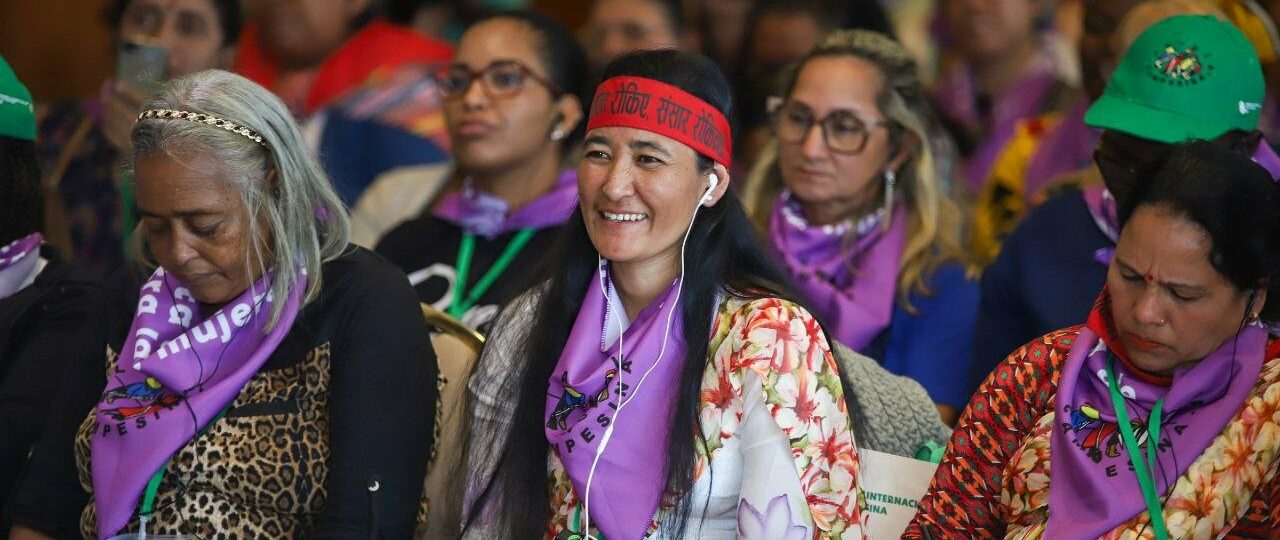Women from all around the world organize the struggle against capitalism and neoliberalism. In the South Asia region, these forces—in the form of free trade agreements (FTA)—play a huge role in the impoverishment of peasants and women in rural and urban areas. The main agendas of the grassroots movements in Nepal include the struggles to make sure that the Constitution is indeed a basis for guaranteeing the basic rights of all citizens, including food sovereignty and women’s participation in politics. The country has gone through a massive mobilization that culminated, in 2006, in the abolishment of the monarchy and the implementation of a republican government. Since the 2006 revolution, two Constitutions have been drafted: the interim Constitution of 2007, and the present governing Constitution of Nepal, from 2015.
Capire spoke with Daya Laxmi, one of the new members of the International Committee of the World March of Women, representing the Asian-Pacific region. Daya’s nomination to the committee was endorsed during the 13th International Meeting of the WMW, held in October, in Ankara, Turkey, the current headquarters of the WMW’s International Secretariat. In addition to Daya, the region is represented in the committee by: Hadinah Soka, from Indonesia, and Oriane Cingone and Marie-Helene Trolue, from New Caledonia. In her country, Daya is also the treasure of the All Nepal Peasants’ Federation (ANPFa Nepal), a member organization of La Via Campesina.
In this interview, Daya talked about the impacts of FTAs on her country, the peasant struggle, the struggle to make food sovereignty a fundamental right, and how women organize to fight the patriarchy embedded in traditions. This interview was conducted during the 8thConference of La Via Campesina, which took place in December 2023, in Bogota, Colombia. During the conference, more than 400 delegates from the movement and its ally organizations gathered to build the struggle under the slogan “Faced with global crises, we build food sovereignty to ensure a future for humanity!”.

What are the effects of thefree trade agreements nowadays on Nepal and Asia? Are there any free trade agreement in progress?
Free trade agreements bring so many challenges to the Asia region. In Nepal, they destroy the rural economy by creating a situation of economic dependency. These agreements in Asia come in different ways, like Bilateral Investment Promotion and Protection Agreements (BIPA), bilateral and multilateral agreements between East Asia and South Asia. In South Asian countries, there is the Asia-Pacific Trade Agreement (APTA), and because of those agreements, countries like Sri Lanka, which was the richest country in the region, are now bankrupt, poor, and facing a huge economic crisis. There’s also a BIPA agreement between Nepal and India, which brings crisis to Nepal’s economy. And also the Regional Comprehensive Economic Partnership (RCEP), a free trade agreement between South Asian countries and Australia, China, Indonesia, Japan, and South Korea, which has deeply affected the region.
This big number of free trade agreements deeply rooted in the region has affected and victimized small and middle peasant groups. Landless people, small peasants, they are producing food and all sorts of products, but they are not getting markets. The markets and even their means of production are being captured by the capitalist and neoliberal powers. These small peasants don’t have ownership of land or they are losing their lands, which makes them poor. There are many effects on their lives that we can talk about, such as the economic crisis and the absence of markets for the goods produced by small peasants. This creates hunger, conflicts, labor exploitation, disparity, and discrimination while the peasants are deprived of their rights. The impacts of these FTA in the region can be seen in the climate and economic crisis we are living. They violate human rights. Small peasants, the real peasants, are becoming more landless.
What have been the effective consequences for peasant women of including food sovereignty in Nepal’s movement building? What are the challenges in this sense?
The agrarian and peasant movement in Nepal has started 70 years ago. In 2015, we promulgated a new Constitution, because we had people struggling since 2006. This new Constitution guarantees that food sovereignty is a fundamental right for our people. We are now promulgating the Agriculture Act, which has already been passed, but has not been implemented yet. Peasants have mandatory rights according to our Constitution, and this act is how these rights will be implemented. This act was formulated and constructed by the Parliament for peasants, and it indicates what peasants should do and what their rights are. What we will implement—that is an act. Women’s participation in the negotiations for the construction of the act has been strong. We have participated in the discussion of every aspect of it regarding agriculture with the ministry, the federal level, the provincial level, and even the local bodies. In Nepal, in every tier of the government, women’s representation is mandatory. Also, there must always be an Indigenous representation.
There are some challenges. The United Nations Declaration on the Rights of Peasants and Other People Working in Rural Areas (UNDROP) hasn’t been completely implemented, so we try to create new laws or legal procedures for it to be implemented. The declaration guarantees peasants’ rights and ownerships. But the agriculture sector is very hard to change because of the international or foreign intervention in national issues. These different foreign powers—imperialists and capitalist powers—are trying to force land bank programs and foreign direct investment. Those programs are trying, for example, to implement pipelines in the country, but the organized peasants are fighting against them, and they have not been implemented so far.
Foreign power is trying to attract all kinds of interventions, but food sovereignty is our right, so we have formulated a new Constitution that is being implemented, but how we can protect these rights is a challenge.
Daya Laxmi
We should raise awareness among peasants and all people regarding their rights. Nepal is a diverse country; our languages, our culture, our rituals show our diversity. It is a multilingual, multicultural, and multitraditional country, so how can we get unity from diversity? This is an agricultural country, and most of the women from the country depends on this activity, even though they don’t have their rights and ownership. Women are in the land. According to the latest census of 2020, in Nepal there are 1.5 million women engaged in agriculture, but only 21 percent have their land ownership. The rest of them is landless, or the land is in the name of the men in the family. Capitalist international intervention is our biggest challenge. We have natural resources, but those are not accessed by women. The patriarchy is the obstacle to the implementation of women’s rights.
Can you talk more about the patriarchal dimension in cultural traditions? How are women building feminism in these cultural traditions?
We live under an unequal and patriarchal society that for a long time didn’t allow women to come out of the kitchen. As a result of the women’s struggle, during the grassroots revolution of 2006, women guaranteed many of their rights. After the interim constitution of Nepal established that year, a constituent assembly election was held, and women leaders raised their voices to guarantee 33 percent participation in every institution that forms part of the government and in civil society organizations. Now, federally, we have a president and a vice president, and one of them must always be a woman. We are making laws to guarantee equality between men and women, with parity, and without discrimination.
Our challenges are to protect our rights and implement those achievements. We can scatter, we can raise awareness, we can organize training efforts to the people, to women. Women are highlighting that the capitalist and imperialist forces increase the discrimination in the society. And to fight it, we build our laws, like the Agriculture Act, the Domestic Violence Act and the laws for the implementation of the UNDROP. These legal procedures, these laws are supportive to the women’s rights established in the country. We are struggling for a structural reform of society.




